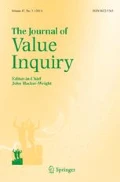Notes
Egan 2007.
Stevenson 1944, chapter 1.
Gibbard 2003.
Egan 2007, pp. 206.
Heather Arnold has emphasized in conversation the significance of this point.
Egan 2007, p. 214.
Blackburn 2009.
Street 2011. Street herself notes the affinity on p. 23, note 43.
First stated in Street 2006.
Street 2011, p. 13.
Gibbard 2011.
Ibid., p. 44.
Gibbard 1990, pp. 199–201.
Nicomachean Ethics, Book 2.
Again Gibbard is there ahead of me. “A person who is wholly unpersuadable would get few benefits from normative discussion…He would be a poor candidate for cooperative social life; he would risk ostracism. It would also be costly, though, to be a pushover in discussion. To evince compliance to any demands whatsoever, so long as they were made in the name of putative norms, would open a person to manipulation. What might be advantageous then, is some tendency to gravitate towards the norms of those around one, together with some firmness in sticking to the norms one has hitherto accepted.” 1990, pp. 77–78.
1990, p. 72.
2011, p. 48.
Williams 1981.
This may be questioned by pointing to the abundant documentation for very deep and extensive moral disagreement. See e.g. Doris and Plakias 2008, Olson 2011, esp. p. 72. But the significance of this can be overrated. Deep and extensive is not at all the same as fundamental. Three pints are worth stressing. (1) It is important to notice how even deep disagreement ordinarily has, as noted above, a massive background of agreement. Because the former is a problem it is often far more salient to us than the latter but we should not ignore the latter. (2) Fundamental disagreement is disagreement that is not resolved when parties are fully rational and fully informed. As all human parties to actual disagreement tend to be very far from fully informed and very imperfectly rational, we should properly be extremely cautious in diagnosing that disagreement is fundamental (much more so, I would suggest, that Doris and Plakias). (3) Fundamental disagreement is not the same as disagreement about fundamentals and cases of the latter need not be cases of the former. (See the discussion of Olson in Lenman 2013, pp. 402–403.)
Williams 1985, chapter 9.
Hume 2000, pp. 301–302 (3.1.1).
Nagel 1997.
This sentence is suggested by, though it may not quite translate, words attributed to Confucius at Analects 15.29.
References
The Analects of Confucius
Aristotle: Nicomachean Ethics.
Simon Blackburn: Spreading the Word: Groundings in the Philosophy of Language (Oxford: Oxford University Press, 1984).
Simon Blackburn: Ruling Passions: A Theory of Practical Reasoning (Oxford: Oxford University Press, 1998).
Simon Blackburn: “Truth and A Priori Possibility; Egan’s Charge Against Quasi-Realism” in Australasian Journal of Philosophy 87, 2009, pp. 201–213.
John M. Doris and Alexandra Pakias: “How to Argue About Disagreement: Evaluative Diversity and Moral Realism” in Walter Sinnott-Armstrong (ed.): Moral Psychology. Volume 2: The Cognitive Science of Morality: Intuition and Diversity (Cambridge, MA: MIT Press, 2008), pp. 303–331.
Andy Egan: “Quasi-Realism and Fundamental Moral Error” in Australasian Journal of Philosophy 85, 2007, pp. 205–219.
Stephen Finlay: “The Error in the Error Theory” in Australasian Journal of Philosophy 86, 2008, pp 347–368.
Allan Gibbard: Wise Choices, Apt Feelings: A Theory of Normative Judgment (Oxford: Oxford University Press, 1990).
Allan Gibbard: Thinking How to Live (Cambridge, MA: Harvard University Press, 2003).
Allan Gibbard: “How Much Realism?” in Oxford Studies in Metaethics 6, 2011, pp. 33–51.
David Hume: A Treatise of Human Nature (eds. Norton and Norton) (Oxford: Oxford University Press, 2000).
James Lenman: “Ethics Without Errors”, in Ratio 26, 2013, pp. 391–409.
Thomas Nagel, The Last Word (New York: Oxford University Press, 1997).
Jonas Olson: “In Defense of Moral Error Theory” in Michael Brady (ed.), New Waves in Metaethics (Houndmills: Palgrave MacMillan, 2011), pp. 62–84.
C.L. Stevenson: Ethics and Language (New Haven: Yale University Press, 1944).
Sharon Street: “A Darwinian Dilemma for Realist Theories of Value” in Philosophical Studies 127, 2006, pp. 109–166.
Sharon Street: “Mind-Independence Without the Mystery: Why Quasi-Realists Can’t Have it Both Ways” in Oxford Studies in Metaethics 6, 2011, pp. 1–32.
Bernard Williams: Internal and External Reasons” in his Moral Luck (Cambridge: Cambridge University Press, 1981), pp. 101–113.
Bernard Williams: Ethics and the Limits of Philosophy (London: Fontana/Collins, 1985).
Author information
Authors and Affiliations
Corresponding author
Additional information
Earlier versions were given to the conference on “Knowing What to Do” at the University of Kent at Canterbury, 9th–10th April, 2011 and to a workshop on the Limits of Realism about Value and Taste at the Northern Institute of Philosophy, University of Aberdeen on 17th December 2012. I am grateful to the other participants on both these occasions. I would also like to thank Heather Arnold, Holly Lawford-Smith, Jonathan Smith and Valerie Tiberius for helpful discussion. I am particularly grateful to Sabine Roeser and Joel Rickard for their painstaking comments on the near-final version.
Rights and permissions
About this article
Cite this article
Lenman, J. Gibbardian Humility: Moral Fallibility and Moral Smugness. J Value Inquiry 48, 235–245 (2014). https://doi.org/10.1007/s10790-014-9420-6
Published:
Issue Date:
DOI: https://doi.org/10.1007/s10790-014-9420-6

